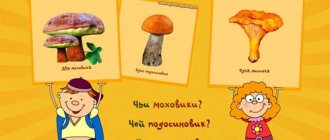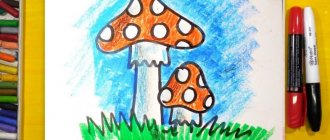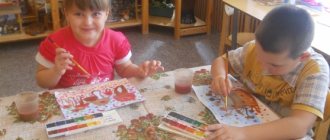Game 3. Grammar game “Mushroom basket. Count the mushrooms"
In this speech game, the child will learn to coordinate numerals with nouns when counting.
Error: For example, you cannot count like this: “one fox, two foxes, three foxes.”
Correct: We think correctly this way: “One fox, two foxes, three foxes.” Or “ONE boletus, two boletus, three boletus. I have three boletus mushrooms.”
The child will not be able to achieve such a score right away, so be patient. Soon he will say everything correctly. And at first, almost all children can count like this: “one fox” or “three flywheels.”
How to behave in case of a child’s grammatical mistakes in this speech game: Do not repeat the child’s mistakes out loud, but simply immediately tell him clearly the correct option.
For example: a child counts mushrooms like this: “One flywheel, two flywheels, three flywheels. I have three flywheels.” You immediately (without repeating after him or focusing on the mistake), repeat the correct option like this: “Three moho-vi-ka! (emphasizing the intonation ending of the word). Yes, you have three...mo-ho-wee-ka.” Our task is to fix the child’s attention on the model, and not on the mistake! In the speech of an adult, it is important for a child to hear only the correct versions of phrases. This is the rule for communicating with a child in ANY SPEECH GAME.
The game gives the child experience, experience of speech in a difficult non-standard problem situation. Give him the opportunity to learn to speak correctly in this experience, do not scold him for mistakes, do not rush, do not be upset by his mistakes yourself, give your child the simple joy of ordinary play. After all, for a child, the main thing in this game will be to pull out lucky cards and score a lot of points, and not to memorize the correct phrases.
You can play as a couple, in a subgroup or with a group of children. If playing with a group of children, it is convenient to play it while sitting around a table or easel.
What you need to play: You will need a complete set of “Mushrooms” pictures (the link to download the set of pictures is given above in this article).
Step 1. Mix all the pictures and place them on the table with the pictures facing down.
Step 2. The first player (we select him according to the counting rhyme) takes a card. You don't have to take it from the top of the pile. The child can take a card from anywhere in the pile. He shows the selected card to all players, counts the mushrooms on it out loud and names the result, for example: “I have three boletus mushrooms” (or “I have two chanterelles”, or “I have six boletus mushrooms”, or “I have one russula”).
If the player answered correctly, he takes this card for himself. If he made a mistake in the count or made a grammatical error (for example, he counted like this: “one fox, two foxes. I have two foxes,” he returns the card to the adult who is leading the game. The adult puts the card back in the pile down under the other pictures.
The task is for everyone to collect as many points as possible, that is, collect as many mushrooms as possible! Our team competes with itself. For example, a mother and child are playing. Today you collected 22 mushrooms in the game during the entire game. And tomorrow -26 mushrooms. Hooray! You collected more than last time. Or maybe you only collected 15 mushrooms? Alas, no luck. Apparently, the mushroom rain did not pass. But definitely better luck next time :).
All found mushrooms are written down in numbers and sketched on paper in a square in rows (one cell is one mushroom, for example, three chanterelles are three cells). Then the child has the opportunity to clearly see how many mushrooms you have collected.
A very important note on the social development of a preschooler in this game:
Of course, this game can also be played as a competitive game to see which player will collect the most mushrooms. But... I really don't like competitive games. Why? I believe that competitive games are good when the child does not make difficult efforts - these are simply games of luck. Or when it's sports games. And a child needs such games! After all, they teach not only how to win, but also how to lose.
But... if the game requires significant effort from the child, if it is difficult for him... Then, in my opinion, it is impossible to set such a difficult task for the child - not only to do tasks that are difficult for him, but also at the same time to struggle with disappointment or even tears , if everyone is lucky, but he is not. I treat children very carefully in this regard.
And I clearly know from experience the delight of the children who all collected 55 mushrooms together! and last time it was only 20! And no one is offended. And everyone is worried about their friend: if another child names it incorrectly, then the mushroom will not end up in the common basket! And we will lose points. And that’s why everyone helps each other, corrects mistakes (“Dima! You named it wrong! Well, think about it, you can do it!”), support each other.
I really want games like this to develop in children not the ability to compete with each other, but the ability to cooperate and support each other! This is so lacking in our hectic modern life. And that’s why I’m giving here the option of playing with one team :), and not games - competitions. After all, it is very important for children to learn to experience co-joy and a sense of common victory.
Game 7. What are the names of mushrooms?
This is a game with words that develops a sense of language and allows the child to master the word formation system of the Russian language.
The main thing in this game with words is not to suggest the correct answer, but to allow the child to experiment with the language and come up with it on their own. what would he call such mushrooms? This is a game in which the child acts with words and their parts as with a construction set, from the familiar parts of which a new figure can be assembled.
Very important: If a child comes up with a word in a speech game that is not in Russian, for example, he said that if mushrooms are stewed, then these are “stew” mushrooms, then do not laugh at his answer. Just tell your child: “You know, such a word could exist in Russian. But people agreed to call such mushrooms differently. They are called “stewed mushrooms”. And other dishes that are stewed are also called. If you stew cabbage, what kind of cabbage is it? Braised cabbage. If you stew carrots. it will turn out to be stewed carrots. And if you stew potatoes, what kind of potatoes will you get? That's right, stewed." The main thing is to give the correct example and its application in different situations in life. A child’s word creativity (his inventing new words in the Russian language) is a manifestation of the same “linguistic talent” of every small child that Korney Ivanovich Chukovsky wrote about in his book “From Two to Five.”
Phrases for the speech game “What are mushrooms called?”:
- If you boil mushrooms, what kind of mushrooms will you get? ( boiled).
- If mushrooms are fried, then these are mushrooms... what kind? what can they be called? ( fried ).
- If mushrooms are pickled, then these are mushrooms... what kind? ( pickled )
- If you stew mushrooms, you will get mushrooms... what kind? ( stewed )
- If mushrooms are dried, what mushrooms are obtained... what kind? (dried)
- If mushrooms are salted, what kind of mushrooms will you get? ( salty ).








